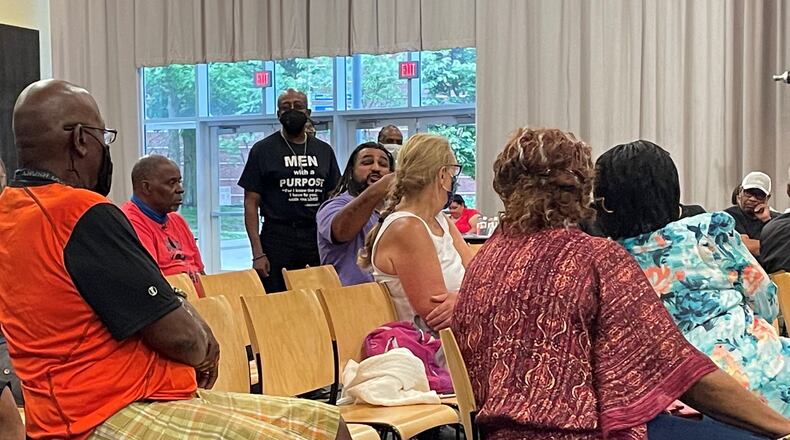“We are here to come to an understanding as to why we are having so much violence today, and why is it at the hands of our young people,” said Springfield NAACP president Denise Williams.
Leading the discussion were a variety of panel speakers: Stephen Massey of Citilookout; Bishop Ronald M. Logan of the Greater Grace Temple; Springfield mayor Warren Copeland; Brentt Hogan of Springfield City School District; Shela Blanchard of Moms Demand Action; Dayton mass shooting survivor Dion Green; Greta Mayer of the Mental Health Recovery Board of Clark, Greene and Madison counties; survivor and community member Stacy Cameron and Dr. Mecca S. Carter-Marshall of Unspoken Courage. The moderator for the night was Jennipher Brown, also of Mental Health Recovery Board of Clark, Greene and Madison counties.
Gun violence in the city of Springfield is increasing and changing, said Clark County Prosecutor Dan Driscoll. Both shooters and victims are increasingly younger, with people as young as 15 shooting guns or being shot. More shooters are involved in gun related incidents than in past years, multiple guns are being used, and more fire power is involved in shootings locally.
From Jan. 1 to July 13 this year, 695 calls for service involving guns were made in Springfield, averaging to roughly 3.6 calls per day. Some of these calls may have been in reference to the same event, but in total, the city this year has only seen 15 days without a shots fired call, Driscoll said.
Springfield has lost young lives to gun violence this year, with three shootings resulting in fatalities and multiple injury shootings under investigation.
Panel speakers and community members discussed numerous factors that impact gun violence locally: access to guns, to start. Many firearms are locally sold through Facebook Marketplace, said Green. And young people can access guns in their households if they are not properly stored and locked.
The crisis in mental health, and the lack of opportunity, support and space for young people to speak was also discussed by attendees and panel speakers alike.
Panel speaker Cameron lost her daughter, Shauna, on Mother’s Day following a shooting in Riverside. Cameron said a spiritual component also exists in the issue, and local faith communities can work to build up people in distress and who need support: whether it be parents or children.
“Broken parents are raising broken children who grow up to be broken people,” she said. “These men and women were raised by the world. And the world, the music, the movies they listen to… it tells them who they have to be. We have an opportunity to speak to, encourage kids in our neighborhoods. If you see them going that path, tell them they’re better than that, please.”
Dr. Carter-Marshall agreed, saying faith communities should transform into spaces to talk about trauma.
“They’re angry,” she said. “We need to stop stigmatizing the very things our men, women and children are walking around with.”
Multiple panelists and attendees discussed ideas surrounding increasing opportunities for younger people to be involved in the community and connect with one another, whether it be through after-school programming, volunteer initiatives or through local employment.
Panel speaker Green’s dad died in his arms in 2019 following the mass shooting in Dayton. Since then, he has worked with survivors of gun violence following mass shootings in Buffalo and Uvalde and is active in Springfield’s schools, connecting with young people through programming geared toward making choices. He said he hopes people will leave the conversation and act.
“I’m tired of talking about this. We need action,’ he said. “I’m trying to stop people from feeling this pain. I’m tired of seeing people lose their loved ones. I’m tired of seeing families crying. The only thing that conquers hate is love, but if you’re being complicit and saying nothing, you’re part of the problem.”
Local NAACP leaders are now planning a similar community conversation, but only for teens and young adults. The event, with its date to be announced in the future, will feature a job fair portion and local vendors to help young people connect with opportunities, Williams said.
About the Author

